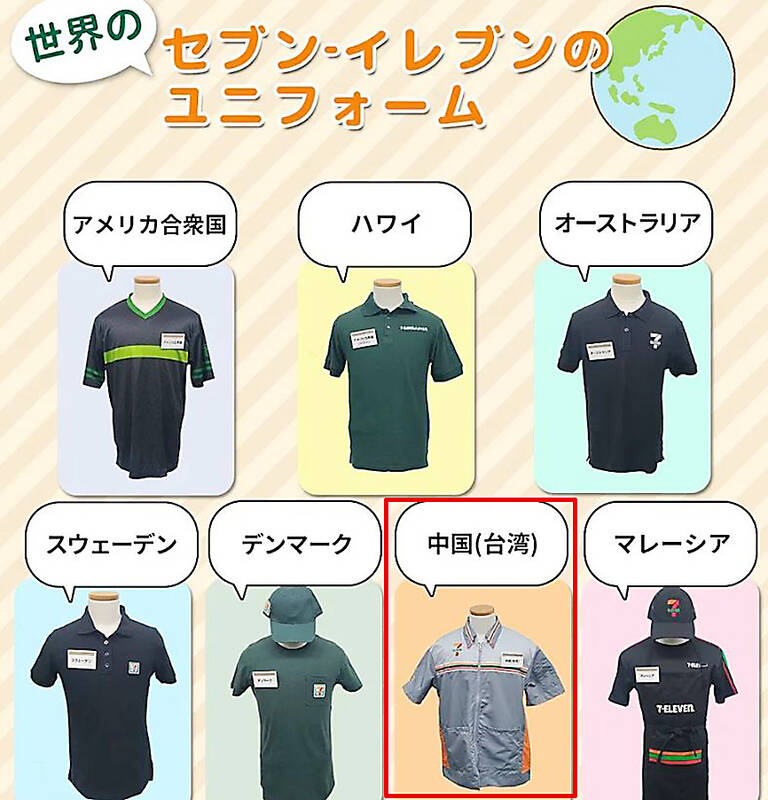Internet users in Taiwan and Japan criticized the misrepresentation of Taiwan as “China (Taiwan)” by Japan’s 7-Eleven in a picture displaying 7-Eleven employee uniforms of different countries.
Japan’s 7-Eleven on Friday posted a picture of various 7-Eleven uniforms around the world on X, asking followers to leave a comment on which one was their favorite. However, the one most familiar to people in Taiwan was tagged as “China (Taiwan),” provoking widespread criticism from Taiwanese and Japanese Internet users.
One Internet user said in the comment area that it was a deliberate misrepresentation, given that the US was not tagged onto Hawaii in the picture.

Photo: Screen grab from the X account of Japan’s 7-Eleven
Japan’s 7-Eleven late on Saturday night removed the post and published an apology. It apologized for causing discomfort due to the inconsiderate content and promised to be more careful.
Although Japanese academics familiar with cross-strait affairs attributed the controversial post to Japanese companies’ lack of awareness about the Taiwan-China relationship, they said the underlying cause might lie in Japanese school textbooks, most of which have long been using debatable descriptions of Taiwan-related matters.
For example, the median line of the Taiwan Strait was removed from maps to indicate Taiwan as “part of China,” or data were sourced from Chinese statistics to create charts and tables, with information about Taiwan colored the same as China, they said.
Misleading textbook narratives even claim that Japan “returned Taiwan to China” in 1945, or that the China-Taiwan status quo is “divided.”
Tokyo allow private publishers to compile textbooks, which can be published and used by schools with approval from the Japanese Ministry of Education, Culture, Sports, Science and Technology (MEXT).
Teikoku-Shoin, one of the Japanese publishers that erroneously marked Taiwan as part of China, said its mischaracterizations of cross-strait issues were “based on the Japanese government’s view,” the Sankei Shimbun reported.
However, the MEXT has never “acknowledged” Taiwan as belonging to China, although it reviews textbook maps based on Tokyo’s principle of “understanding and respecting” Beijing’s stance about Taiwan-China relations as set forth in the Japan-China Joint Communique, it reported.
Mischaracterizations of Taiwan such as Teikoku-Shoin’s textbook narratives are out of place with the mainstream public opinion of Taiwan, and might be part of Chinese influence and infiltration warfare against Japan, the Sankei Shimbun reported.
Such narratives might also be exploited to incite anti-US sentiment in Japan if US armed forces based in Japan begin to use Japanese military bases to help defend Taiwan in potential cross-strait conflicts, the report said.
Many pro-Taiwan Japanese civic groups as well as Taiwanese civic groups in Japan have been urging the MEXT to correct such erroneous textbook content since 2005.
The Taiwanese Association in Japan and the Taiwan Research Forum occasionally jointly hold signature campaigns at major train stations in Tokyo, with the latest one held at Ikebukuro Station last month.
The petition aims to urge the MEXT to ask Japanese publishers to correct mischaracterizations and promote Japanese students’ understanding of Taiwan as a democracy that does not belong to China.
The forum had submitted a petition to the MEXT in 2007 and is slated to file another petition to the Japanese National Diet.
Additional reporting by CNA

A magnitude 7.0 earthquake struck off Yilan at 11:05pm yesterday, the Central Weather Administration (CWA) said. The epicenter was located at sea, about 32.3km east of Yilan County Hall, at a depth of 72.8km, CWA data showed There were no immediate reports of damage. The intensity of the quake, which gauges the actual effect of a seismic event, measured 4 in Yilan County area on Taiwan’s seven-tier intensity scale, the data showed. It measured 4 in other parts of eastern, northern and central Taiwan as well as Tainan, and 3 in Kaohsiung and Pingtung County, and 2 in Lienchiang and Penghu counties and 1

FOREIGN INTERFERENCE: Beijing would likely intensify public opinion warfare in next year’s local elections to prevent Lai from getting re-elected, the ‘Yomiuri Shimbun’ said Internal documents from a Chinese artificial intelligence (AI) company indicated that China has been using the technology to intervene in foreign elections, including propaganda targeting Taiwan’s local elections next year and presidential elections in 2028, a Japanese newspaper reported yesterday. The Institute of National Security of Vanderbilt University obtained nearly 400 pages of documents from GoLaxy, a company with ties to the Chinese government, and found evidence that it had apparently deployed sophisticated, AI-driven propaganda campaigns in Hong Kong and Taiwan to shape public opinion, the Yomiuri Shimbun reported. GoLaxy provides insights, situation analysis and public opinion-shaping technology by conducting network surveillance

‘POLITICAL GAME’: DPP lawmakers said the motion would not meet the legislative threshold needed, and accused the KMT and the TPP of trivializing the Constitution The Legislative Yuan yesterday approved a motion to initiate impeachment proceedings against President William Lai (賴清德), saying he had undermined Taiwan’s constitutional order and democracy. The motion was approved 61-50 by lawmakers from the main opposition Chinese Nationalist Party (KMT) and the smaller Taiwan People’s Party (TPP), who together hold a legislative majority. Under the motion, a roll call vote for impeachment would be held on May 19 next year, after various hearings are held and Lai is given the chance to defend himself. The move came after Lai on Monday last week did not promulgate an amendment passed by the legislature that

Taiwan is gearing up to celebrate the New Year at events across the country, headlined by the annual countdown and Taipei 101 fireworks display at midnight. Many of the events are to be livesteamed online. See below for lineups and links: Taipei Taipei’s New Year’s Party 2026 is to begin at 7pm and run until 1am, with the theme “Sailing to the Future.” South Korean girl group KARA is headlining the concert at Taipei City Hall Plaza, with additional performances by Amber An (安心亞), Nick Chou (周湯豪), hip-hop trio Nine One One (玖壹壹), Bii (畢書盡), girl group Genblue (幻藍小熊) and more. The festivities are to